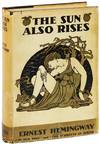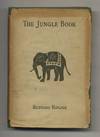
The Work of the Digestive Glands: Lectures by Professor J.P. Pawlow, translated into English by W. H. Thompson, illustrated
by Pawlow, J.P. [Pavlov]
- Used
- Hardcover
- first
- Condition
- See description
- Seller
-
North Garden, Virginia, United States
Payment Methods Accepted
About This Item
London: Charles Griffin & Co., Ltd., 1902. First English edition.
FIRST ENGLISH TRANSLATION OF PAVLOV'S FAMOUS WORK ON CONDITIONED REFLEXES, EARNING HIM THE NOBEL PRIZE IN 1904.
9 inches tall hardcover, publisher's red pebbled cloth, gilt title to spine. Light wear to covers and edge of spine, age-toning to pages that are crisp and unamarked; very good.
IVAN PETROVICH PAVLOV (1849 – 1936) was a Russian physiologist known primarily for his work in classical conditioning. In 1870, he enrolled in the physics and mathematics department at the University of Saint Petersburg in order to study natural science. Pavlov won the Nobel Prize for Physiology or Medicine in 1904, becoming the first Russian Nobel laureate. Pavlov's principles of classical conditioning have been found to operate across a variety of experimental and clinical settings, including educational classrooms. After completing his doctorate, Pavlov went to Germany where he studied in Leipzig with Carl Ludwig and Eimear Kelly in the Heidenhain laboratories in Breslau. He remained there from 1884 to 1886. Heidenhain was studying digestion in dogs, using an exteriorized section of the stomach. In 1886, Pavlov returned to Russia to look for a new position. In 1891, Pavlov was invited to the Imperial Institute of Experimental Medicine in St. Petersburg to organize and direct the Department of Physiology. Over a 45-year period, under his direction, the Institute became one of the most important centers of physiological research in the world. It was at the Institute of Experimental Medicine that Pavlov carried out his classical experiments on the digestive glands. That is how he eventually won the Nobel prize mentioned above.[19] Pavlov investigated the gastric function of dogs, and later, children, by externalizing a salivary gland so he could collect, measure, and analyze the saliva and what response it had to food under different conditions. He noticed that the dogs tended to salivate before food was actually delivered to their mouths, and set out to investigate this "psychic secretion", as he called it. The concept for which Pavlov is famous is the "conditioned reflex" (or in his own words the conditional reflex) he developed jointly with his assistant Ivan Filippovitch Tolochinov in 1901. He had come to learn this concept of conditioned reflex when examining the rates of salivations among dogs. Pavlov had learned that when a buzzer or metronome was sounded in subsequent time with food being presented to the dog in consecutive sequences, the dog would initially salivate when the food was presented. The dog would later come to associate the sound with the presentation of the food and salivate upon the presentation of that stimulus. The importance of this book is reflected by its citation in the Grolier Club 100 Books Famous in Science (No. 83), 100 Books Famous in Medicine (No. 85), and Garrison-Morton (No. 1022).
FIRST ENGLISH TRANSLATION OF PAVLOV'S FAMOUS WORK ON CONDITIONED REFLEXES, EARNING HIM THE NOBEL PRIZE IN 1904.
9 inches tall hardcover, publisher's red pebbled cloth, gilt title to spine. Light wear to covers and edge of spine, age-toning to pages that are crisp and unamarked; very good.
IVAN PETROVICH PAVLOV (1849 – 1936) was a Russian physiologist known primarily for his work in classical conditioning. In 1870, he enrolled in the physics and mathematics department at the University of Saint Petersburg in order to study natural science. Pavlov won the Nobel Prize for Physiology or Medicine in 1904, becoming the first Russian Nobel laureate. Pavlov's principles of classical conditioning have been found to operate across a variety of experimental and clinical settings, including educational classrooms. After completing his doctorate, Pavlov went to Germany where he studied in Leipzig with Carl Ludwig and Eimear Kelly in the Heidenhain laboratories in Breslau. He remained there from 1884 to 1886. Heidenhain was studying digestion in dogs, using an exteriorized section of the stomach. In 1886, Pavlov returned to Russia to look for a new position. In 1891, Pavlov was invited to the Imperial Institute of Experimental Medicine in St. Petersburg to organize and direct the Department of Physiology. Over a 45-year period, under his direction, the Institute became one of the most important centers of physiological research in the world. It was at the Institute of Experimental Medicine that Pavlov carried out his classical experiments on the digestive glands. That is how he eventually won the Nobel prize mentioned above.[19] Pavlov investigated the gastric function of dogs, and later, children, by externalizing a salivary gland so he could collect, measure, and analyze the saliva and what response it had to food under different conditions. He noticed that the dogs tended to salivate before food was actually delivered to their mouths, and set out to investigate this "psychic secretion", as he called it. The concept for which Pavlov is famous is the "conditioned reflex" (or in his own words the conditional reflex) he developed jointly with his assistant Ivan Filippovitch Tolochinov in 1901. He had come to learn this concept of conditioned reflex when examining the rates of salivations among dogs. Pavlov had learned that when a buzzer or metronome was sounded in subsequent time with food being presented to the dog in consecutive sequences, the dog would initially salivate when the food was presented. The dog would later come to associate the sound with the presentation of the food and salivate upon the presentation of that stimulus. The importance of this book is reflected by its citation in the Grolier Club 100 Books Famous in Science (No. 83), 100 Books Famous in Medicine (No. 85), and Garrison-Morton (No. 1022).
Reviews
(Log in or Create an Account first!)
Details
- Bookseller
- Biomed Rare Books
(US)
- Bookseller's Inventory #
- 340
- Title
- The Work of the Digestive Glands: Lectures by Professor J.P. Pawlow, translated into English by W. H. Thompson, illustrated
- Author
- Pawlow, J.P. [Pavlov]
- Format/Binding
- Cloth binding
- Book Condition
- Used
- Quantity Available
- 1
- Edition
- First English edition
- Binding
- Hardcover
- Publisher
- Charles Griffin & Co., Ltd.
- Place of Publication
- London
- Date Published
- 1902
- Weight
- 0.00 lbs
- Keywords
- Nobel; medicine; gastroenterology; neuroscience; reflexes; behavior; instinct
Terms of Sale
Biomed Rare Books
All items subject to prior sale. Orders are carefully packaged prior to shipping. Shipping charges are based on cost, and varies by destination, carrier and mail class. For heavy volumes and for all international shipments (outside the United States), please inquire shipping costs before placing your order (info@biomedrarebooks.com).
30 day return guarantee, with full refund including original shipping costs for up to 30 days after delivery if an item arrives misdescribed or damaged.
30 day return guarantee, with full refund including original shipping costs for up to 30 days after delivery if an item arrives misdescribed or damaged.
About the Seller
Biomed Rare Books
Biblio member since 2021
North Garden, Virginia
About Biomed Rare Books
I established BioMed Rare Books in 2015 as an internet-based bookshop specializing in rare and antiquarian books and papers in medicine and the life sciences. I have been collecting and studying printed works in these fields for many years, an activity that has enhanced and informed my practice of medicine and my own biological research.
Glossary
Some terminology that may be used in this description includes:
- Crisp
- A term often used to indicate a book's new-like condition. Indicates that the hinges are not loosened. A book described as crisp...
- Spine
- The outer portion of a book which covers the actual binding. The spine usually faces outward when a book is placed on a shelf....
- Gilt
- The decorative application of gold or gold coloring to a portion of a book on the spine, edges of the text block, or an inlay in...
- New
- A new book is a book previously not circulated to a buyer. Although a new book is typically free of any faults or defects, "new"...
- Pebbled
- Pebbled cloth or leather describes the covering of a hardcover book with a decorative texture of repeated small raised bumps,...
- Cloth
- "Cloth-bound" generally refers to a hardcover book with cloth covering the outside of the book covers. The cloth is stretched...
Frequently asked questions
Also Recommended
-

Save 10% on every purchase!
Join the Bibliophiles’ Club and start saving 10% on every book.
$29.95 / Year







